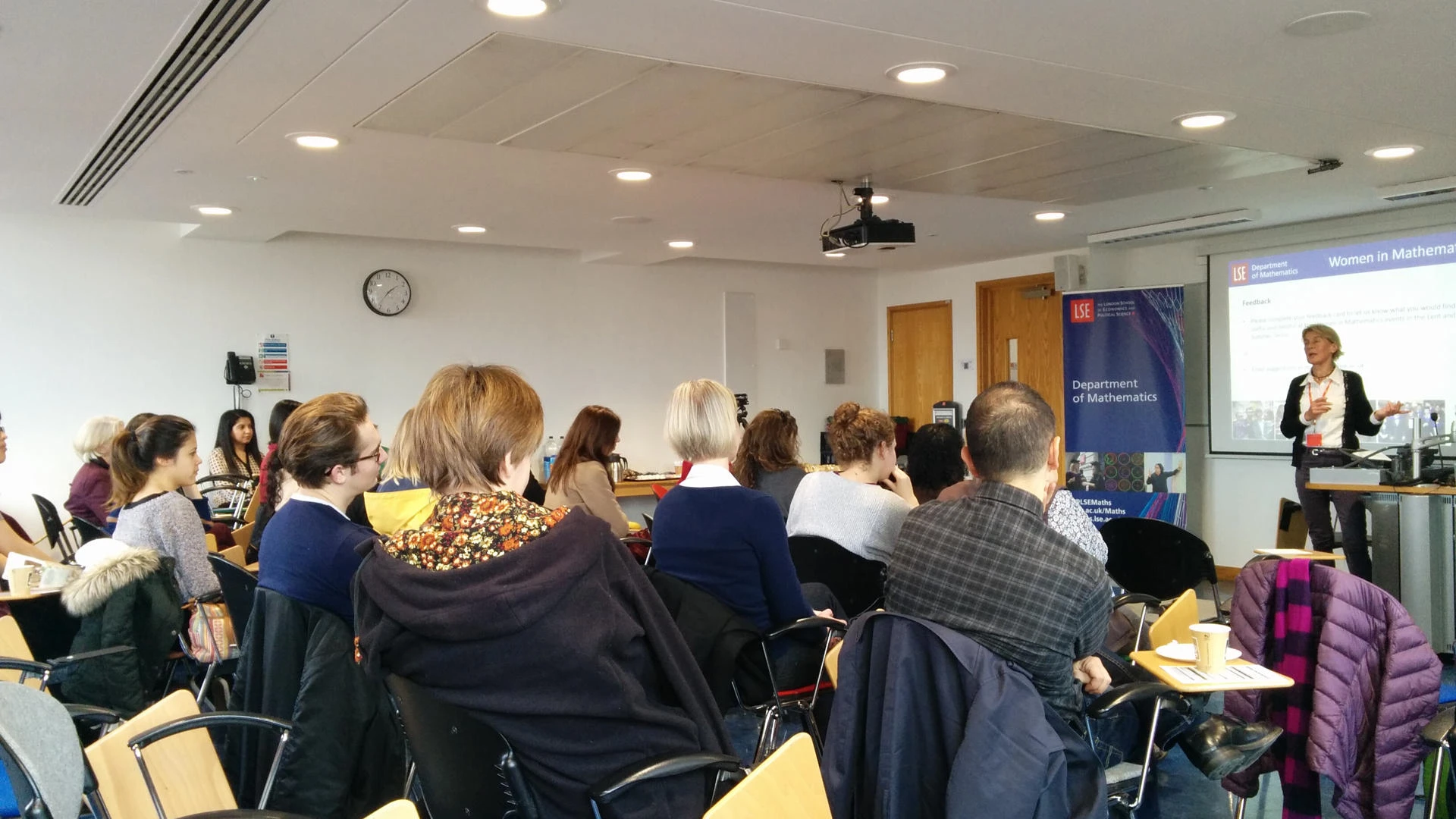Women in Mathematics

An academic, professional and personal development seminar series presented by leading female mathematicians to offer support, encouragement and advice to female staff and students.
All members of the Department of Mathematics are welcome to attend these seminars (UG, MSc, PhD, teachers, faculty, professional services, Alumnae). A networking lunch is provided. Reports and recordings from all seminars will be available on this website shortly after each event.
Abstract
This event will feature an exceptional panel of speakers who will share compelling narratives about real-world experiences in the demanding fields of mathematics, the academic environment at LSE, and the broader professional sphere. The discussion will encompass not only educational and career triumphs but also the critical insights needed to successfully navigate these challenging landscapes.
We proudly feature prominent female mathematicians, distinguished alumnae, and current academics who will offer invaluable insights, practical advice, and candid discussions concerning career pathways, overcoming professional barriers, and achieving success.
Biographies
Dr Jenny Zhenyi Huang (LSE Alumna): Assistant Professor in Finance and Accounting, University College London
Jennifer Cornell (LSE Alumna): Quantitative Analyst – Trading and Execution Analytics, Royal London Asset Management
Jasmin Katz (PhD Candidate): Department of Mathematics, London School of Economics
Contact maths.info@lse.ac.uk to find out how you can attend
Women in Mathematics - An LSE Perspective
Abstract
For this talk, we are delighted to welcome some fantastic speakers to the panel, who will each discuss their personal and professional journeys in mathematics, LSE and the professional world. Join us to discover their challenges and triumphs, and gain valuable insights and advice on navigating a career after your degree.
Biographies
Dr Galit Ashkenazi-Golan - Assistant Professor in the Department of Mathematics
Katerina Michenina – LSE Alumna and Analyst at Goldman Sachs
Dr Katerina Papadaki – Associate Professor in the Department of Mathematics
Dr Yani Pehova – Recent Postdoctoral Research Fellow and Senior Data Scientist at PrecisionLife Ltd
Sophie Steiert – LSE Alumna and Associate at L.E.K. Consulting
The Quest for Structure - A Quest for Beauty?
Abstract
Drawing on examples of her recent research in discrete mathematics amongst others, Julia's talk aims to illustrate how the quest for structure in mathematics can lead to questions and concepts of intangible yet lasting aesthetic appeal. Recalling key events from her own mathematical career date along the way, Julia will also attempt to examine to what extent aesthetic sensibility, opportunity, personality, and chance influence an individual's mathematical path.
Biography
Julia Wolf is Professor of Pure Mathematics at the University of Cambridge, where she was both an undergraduate and a graduate student. After obtaining her PhD, she spent three years in the United States, with postdoctoral fellowships at the Institute for Advanced Study in Princeton and MSRI at Berkeley, followed by an assistant professorship at Rutgers University. Between 2010 and 2013, she held a Hadamard Associate Professorship at Ecole Polytechnique in Paris, and between 2012 and 2018, a Heilbronn Readership at the University of Bristol, where she served as Associate Chair of the Heilbronn Institute for Mathematical Research for three years.
Her research interests lie at the intersection of combinatorics, number theory, harmonic analysis, and more recently, model theory. In 2016, she was awarded the Anne Bennett Prize of the London Mathematical Society, and in 2022, she was elected Chair of the British Combinatorial Committee.
Becoming a Good Mathematician: Practical Ethics for the Mathematical Sciences
Abstract
Erica starts from the premise that all of our mathematical choices have practical and ethical implications. To illustrate this, Erica will recap her mathematical career and interests, presenting some solved and unsolved problems in geometry, fluid dynamics, complex modelling, forecast evaluation and statistical inference. Using examples including climate change and Covid-19, she will demonstrate the mathematical consequences of (lack of) social diversity in the mathematical sciences, and show how our ethical standpoint as mathematicians can be fundamental to understanding and re-imagining the world around us and making responsible decisions about the future.
Speaker biography
Dr Erica Thompson is a UKRI Future Leaders Fellow and senior policy fellow in the Ethics of Modelling and Simulation at the LSE Data Science Institute. She works on an interdisciplinary programme of research about the construction, calibration and interpretation of mathematical models including climate and weather models, with applications in public health, finance, humanitarian response and climate adaptation. Erica has an MMath (Cambridge Part 3, fluid dynamics options) and a PhD in Physics (Imperial College), and now at the Data Science Institute. She is also affiliated with the London Mathematical Laboratory, which supported the publication of Escape From The Model Land(Basic Books, 2022).
Data for Decisions
Abstract
Emma’s talk will focus on how data has driven her career, not just in terms of the application areas of her research, but also as central to her journey from a departmental academic to university leadership positions. Emma will also outline some recent research and data projects, ranging from the impact of the introduction of interventions in road networks; personalisation strategies in online controlled experiments; and the use of data in the regulatory environment in education.
Speaker biography
Professor Emma McCoy joined LSE as the Pro-Director (Education) in 2022, and previously was the Vice-Provost (Education and Student Experience) and a Professor of Statistics in the Mathematics Department at Imperial College London. Her research interests include time series, wavelets and causal inference, with a particular substantive research interest in transport studies. Emma is a member of the Royal Society’s Advisory Committee for Mathematics Education (ACME) and a Fellow of the Institute of Mathematics and its Applications and the Royal Statistical Society.
The epidemiological impact of the NHS COVID-19 app
Abstract
Contact tracing is an important (albeit sometimes unpopular) part of the toolkit for limiting the spread of COVID-19. In this talk I will explain the theoretical motivation for contact tracing and for developing the NHS COVID-19 app. I will provide a brief history of its epidemiological impact which has been significant both in reducing COVID-19 transmission and in providing real-time information on the progression of the epidemic. Along the way, I will provide some reflections on how a once pure mathematician found herself working on a very real-world application, and how it has shaped the way I work.
Speaker biography
Michelle Kendall is a Research Fellow at the University of Warwick in the Health Protection Research Unit in Genomics and Enabling Data. Her work centres around developing statistical methods and software to answer questions about epidemiology and evolution. Since early 2020 she has focused on evaluating the impact of interventions on the spread of COVID-19 and currently holds an honourary position with UKHSA advising on the NHS COVID-19 app.
The Impact Covid has on Women in Mathematics
Abstract
One truism from the past year is that the pandemic has not affected everybody equally. This is also true in academia and in mathematics. Early career academics, and parents, especially women, have suffered more, through loss of opportunities and time. I will discuss some of the evidence that has emerged on this and suggestions for mitigation (more are needed!), drawing on the resources from the Open Letter from the European Women in Mathematics society on the Impact on Junior and Women Mathematicians of the Corona Crisis.
There will be time for discussion with the audience.
Speaker biography
Diane Maclaganis Professor of Mathematics at the University of Warwick. She moved to Warwick in 2007 from the US, having received her PhD from UC Berkeley in 2000 under the supervision of Bernd Sturmfels. Her research is in algebraic geometry, with a particular focus on tropical geometry. She is a member of the London Mathematical Society (LMS) Committee for Women and Diversity in Mathematics.
Britta Srivas will be speaking during the Professional and Personal Development Series for first year student members of the Department of Mathematics.
Britta is a Goldman Sachs banking saleswoman turned startup data scientist. She has worked in finance, logistics, engineering and satellite space technologies. She studied BSc Maths with Economics at the LSE and then went on to do her MSc Scientific Computation at University of Nottingham where she completed her dissertation in quantum computing. She is now about to join a tech startup incubator programme called Entrepreneur First to found her own startup using tech for good.
Machine learning for personalised mental healthcare: a human-centred approach
Abstract
Machine learning advances are opening new routes to more precise healthcare, from the discovery of disease subtypes for stratified interventions to the development of personalised interactions supporting self-care between clinic visits. This offers an exciting opportunity for machine learning techniques to impact healthcare in a meaningful way. Within the healthcare domain, machine learning for mental healthcare is an under-investigated area and yet a potentially highly impactful area of research. In this talk, I will present recent work on probabilistic graphical modelling to enable a more personalised approach to mental healthcare, whereby information can be aggregated from multiple sources within a unified modelling framework. We present a human-centred approach to mental healthcare which is aimed at increasing the effectiveness of psychological wellbeing practitioners.
Biography
Dr. Danielle Belgrave is a Principal Researcher Manager at Microsoft Research, in Cambridge (UK) in the Health Intelligence group where she leads Project Talia. She is particularly interested in integrating medical domain knowledge to develop probabilistic graphical models to develop personalized treatment strategies in health. Originally from Trinidad and Tobago, she received her BSc in Business Mathematics and Statistics from London School of Economics, an MSc in Statistics from University College London and her PhD in Machine Learning and Statistics for Healthcare from The University of Manchester where she was a Microsoft Research PhD scholar. Prior to joining Microsoft Research, she had a tenured faculty position at Imperial College London.
Athena SWAN is a national charter mark recognising commitment toadvancing gender equality in Higher Education: representation, progressionand success for all. The LSE Department of Mathematics is planning to apply for the Athena SWAN charter mark. Prof Jan van den Heuvel, Head of Department, gave an overview of the activities that were undertaken in preparation for this application.
Three speakers discussed why they decided to study mathematics, their experiences during their studies (including possible challenges and how they overcame them), their next career steps and the application process after their studies and their ideas for the future.
Speakers:
Kate Shilina: a Masters student in Department of Geography and Environment at LSE
Angela Jiang: an Analyst for a quantitative hedge fund name Quadrature Capital
Cathryn Masters: a third year Bachelor student in the Mathematics Department with a job offer from HSBC

This talk focused on how gender is understood, enacted and embodied in STEM careers and will outline some of the opportunities, hurdles and strategies that can help women to succeed in STEM careers. I will start with de-bunking some of the myths and stereotypes about women in STEM and go beyond the headline statistics to look at where women are and what they are doing in different STEM sectors and locations. Drawing on my research with women STEM professionals over a number of years, I will focus on two areas. Firstly career entry- how do women get into STEM careers, what are the difficulties and possibilities for new graduates or indeed those changing careers? What are the growth areas (such as AI, Data Science, Cybersecurity), and what jobs will there be in future for mathematically skilled women? Secondly I will look at career strategiesincluding the impact of career breaks and career change, reflecting how women’s careers are often portrayed as ‘frayed’ and deviant from the perspective of a normative STEM career trajectory.
Biography – Dr Clem Herman
Dr Clem Herman is a Senior Lecturer in the School of Computing and Communications at the UK Open University, and Director of eSTEeM, the Open University’s Centre for STEM Pedagogy. Throughout her career Clem has led a range of projects to support the participation and progression of women in STEM, and her research on the impact of career breaks and women returners to STEM has been widely published. Clem was an invited expert on the European Commission WiST 2 (Women in Science and Technology) project conducting research into the impact of career breaks on women in engineering and technology companies in Europe, and was an expert witness in 2013 to the House of Commons Select Committee on Women in STEM. Her most recent ESRC funded research project, has been a comparative study of Gender, Skilled Migration and IT in India and the UK. Clem is the Open University’s Athena SWAN Lead and chair of the Gender Equality Steering Group. She is also the founder and Editor-in-Chief of the International Journal of Gender Science and Technology.

Speaker: Professor Maria Tamboukou
Numbers & Narratives: Becoming a Woman MathematicianThis talk revolves around a research project of writing a feminist genealogy of women in mathematics, looking into the socio-historical conditions of their exclusion, but also tracing processes of going against the grain and becoming a woman mathematician in the margins of the field. This is an interdisciplinary project that combines narrative analysis of significant women mathematicians 'ego' documents, including autobiographies, diaries and letters with annotated bibliographies and reviews of their mathematical papers, as well as evaluations of their contribution to the fields of science and mathematics.
Maria Tamboukou is Professor of Feminist Studies at the University of East London and Leverhulme Research Fellow in 2018-19. She has held visiting research positions in a number of institutions and is currently Affiliated Professor in Gender Studies at Linnaeus University, Sweden and Adjunct Professor at the Institute for Educational Research at Griffith, Australia.

Four LSE Graduates spoke about their careers and offered advice to current staff and students.
Anastasia Kouvelais a Principal in Operation Performance Transformation at A.T. Kearney, a global management consulting firm. She holds a PhD and MSc in Operations Research from LSE.
Claire Cheriyanjoined Transport for London on a Transport Planning & Modelling graduate scheme, after completing an undergraduate degree in Mathematics & Economics at LSE.
Snežana Pejićobtained a PhD in Mathematics from LSE, supported by the Radiocommunications Agency. Snežana is now a Senior Quantitative Researcher at Essentia Analytics in London, a company specialising on behavioural data analytics for the investment sector.
Deepa Ramchandani works for Capita Plc as Head of Financial Modelling. Deepa has an undergraduate degree in Mathematics & Economics from LSE as well as a Masters in Operational Research.

Dr Eugenie Hunsickeris London Mathematical Society Women in Mathematics Chair and senior lecturer in mathematics at Loughborough University. Before this she studied at the University of Chicago, where she received a dissertation fellowship from the American Association of University Women.
She went on to become an associate professor of mathematics at Lawrence University in Wisconsin before moving to the UK. A strong advocate for women in maths, she is an active member of the London Mathematical Society and the Royal Statistical Society.

Professor Julia Blackis the School's interim Director and Pro-Director for Research, spoke about the School's recent Athena SWAN application, and about the School's work on issues relating to Equity, Diversity and Inclusion.

Dr Luitgard Veraartis an Associate Professor in the Department of Mathematics, spoke about her career path to date, in particular focussing on her recent Houblon-Norman/George Fellowship at the Bank of England and how she has combined full time work with having a young family.

Professor June Barrow-Green is Professor of History of Mathematics at the Open University. She is on the Council of the London Mathematical Society and has appeared on both television and radio. She is the author of Poincaré and the Three Body Problemand an editor of the Princeton Companion to Mathematics.At the inaugural seminar she spoke about her journey from art gallery assistant to professor via investment banking, and about her research which includes the origins of chaos theory and the mathematics of the First World War.